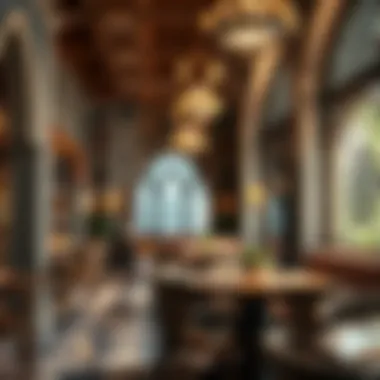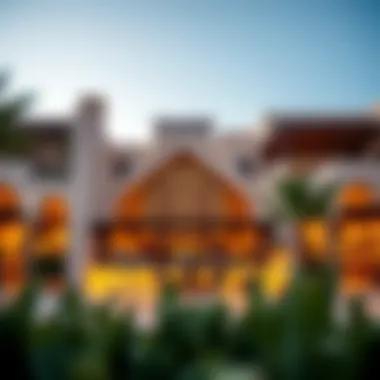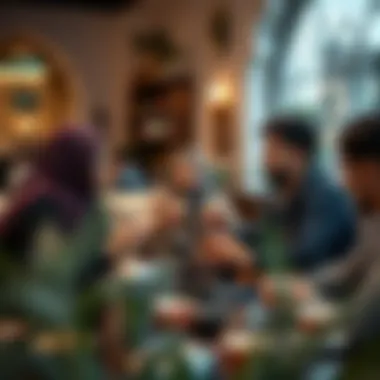Exploring the Charm of Arabic Cafes in Dubai's Real Estate


Intro
Arabic cafes in Dubai are more than just places to enjoy a cup of coffee; they represent a cultural phenomenon that enriches the social fabric of the city. Beyond their aromatic brews and warm breads, these cafes serve as cornerstones of community life, where stories, laughter, and friendships brew alongside traditional beverages. This characteristic makes them vital in understanding the nuances of Dubai's real estate landscape.
In this exploration, we dig into the relationship between these beloved cafes and property investments, shedding light on current trends and economic factors at play. For investors, homeowners, and stakeholders intrigued by Dubai's evolving neighborhood dynamics, understanding this interplay is essential not just for financial tactics, but also for grasping the culture that makes Dubai unique.
Market Analysis
Current Trends in Investment Opportunities
Currently, the real estate market in Dubai is witnessing a notable infusion of interest due to the appeal of social hubs like Arabic cafes. Investors find value in properties near these cafes for several reasons:
- Increased foot traffic: Areas around popular cafes typically see a rise in visitors, contributing to potential rental income.
- Social value: Properties near these gathering spots tend to appreciate faster, as they cultivate a sense of community.
- Diverse clientele: The cross-cultural environment attracts both locals and tourists, making the area lively and desirable.
This blend of community life and commerce creates a ripple effect, boosting property values and attracting an array of potential buyers.
Unsurprisingly, neighborhoods like Jumeirah and Al Wasl have gained popularity, reinforcing their market positions. With developments continuously emerging, opportunities abound for savvy investors looking to tap into the dynamic nature of these hotspots.
Impact of Economic Factors on Property Prices
Economic factors certainly play a pivotal role in shaping the property market. In recent years, several elements have been inherently tied to the rise and fall of property prices:
- Global economic conditions: Events on an international scale, whether they're financial crises or economic booms, create ripples that often resonate in Dubai's market, influencing investor confidence.
- Government policies: Regulations regarding property ownership, such as resettlement designs and taxation reforms, can't be overlooked. Initiatives aimed at boosting tourism and investments enhance the value proposition of neighborhoods featuring these cafes.
- Real estate speculation: Areas known for their vibrant cafe culture are attractive spots for real estate speculation, where investors sense opportunities for future profits.
Understanding these economic factors can provide insights into pricing trends, helping investors make more informed decisions when entering the Dubai real estate fray.
"Investors often underestimate the cultural allure tied to property value, especially in a cosmopolitan hub like Dubai."
As we move further, it will become evident how these cafés not only influence property dynamics but also shape the lifestyle and community spirit of Dubai.
The Essence of Arabic Cafes
Arabic cafes are more than just places to grab a quick cup of coffee; they serve as cultural hubs that capture the spirit of social interaction in Dubai. They weave together the threads of community, tradition, and modernity, making them essential to the city’s identity. The allure of these cafes replenishes their reputation as gathering spots, fueling both social connections and contributing to the local economy. This exploration will delve into the historical context that has shaped these cafes and their functionality as a melting pot for different cultures.
Historical Context
To understand the significance of Arabic cafes in Dubai, one must take a step back in time. These establishments emerged from a rich tradition that dates back centuries, linked to the Bedouin culture where hospitality was paramount. Originally, coffee was prepared and served in tents where travelers would congregate, a practice that appreciated good conversation and spurred connection.
In the early 20th century, cafes began proliferating in urban settings, particularly in the bustling markets of Dubai. The introduction of shisha, or water pipes, transformed these cafes into lively social spots where people would spend hours discussing politics, business, or sharing stories.
This historical foundation is crucial, as it influences present-day cafes, which echo the same inviting spirit while evolving to meet contemporary needs. They become part of the very fabric of residential life, attracting a diverse clientele, from locals to expatriates, shaping hybrid cultural expressions.
Cultural Melting Pot
In the melting pot that is Dubai, Arabic cafes stand out as microcosms of the city's multicultural essence. They invite not just locals but also international visitors, creating a unique setting where various customs intersect. One might sit next to a businessman from London, an artist from Cairo, and a local Emirati sharing a traditional Arabic coffee, or "qahwa."
Within these walls, conversations flow in multiple languages, and every cup served tells a story. The blend of Middle Eastern flavors, intermingled with international tastes—such as a fusion of Arabic sweets and European pastries—captivates the senses and fosters conviviality.
Arabic cafes often host cultural events like poetry readings, art displays, and live music, reinforcing their role in cultural expression and community engagement. They are places where friendships blossom and ideas germinate, facilitating connections that extend beyond the cafe environment.
As one can see, the essence of Arabic cafes is pivotal to understanding their impact on Dubai’s real estate landscape. These cafes enrich the neighborhoods around them, not only by enhancing cultural vibrancy but also by driving social interactions that can positively influence property values.


Architectural Significance
Arabic cafes in Dubai are more than just places to sip on a robust cup of Arabic coffee; they stand as pivotal landmarks that echo the rich cultural heritage of the region. The role these cafes play goes beyond mere social interaction—they serve a critical function in the broader architectural and urban landscape of Dubai. As investors, homebuyers, or anyone captivated by real estate development will understand, the design and integration of these cafes with their surroundings present a unique opportunity for enhancing community life and boosting property values.
Design Elements and Aesthetics
The aesthetic choices in Arabic cafes are not arbitrary; they reflect centuries of cultural heritage steeped in elegance. The use of intricate geometric patterns, lush fabrics, and warm, earthy tones creates an atmosphere that invites both casual patrons and serious investors alike. Elements such as ornate arches, stylized mosaics, and ambient lighting not only contribute to the visual appeal but also engage patrons in an immersive experience. This architectural language tells a story, fostering a sense of belonging while attracting attention from potential customers and residents.
"A well-designed cafe lures you in with its looks, yet keeps you engaged with its essence."
Moreover, these cafes often incorporate traditional elements such as majlis seating arrangements, facilitating communal gatherings. Features like outdoor seating tailored to Dubai's warm climate further enhance the customer experience, allowing visitors to connect with the vibrant urban life around them. This melding of functionality and aesthetics becomes a hallmark of successful Arabic cafes, making them integral to the allure of their respective neighborhoods.
Integration with Urban Fabric
The placement of Arabic cafes is often strategic, acting as critical nodes within the urban fabric of Dubai. These cafes frequently occupy prime locations that enhance pedestrian traffic and create lively social scenes. They develop into local hubs, fostering social interactions that shape community dynamics. For investors, understanding this interplay is crucial; cafes draw in foot traffic, positively influencing nearby real estate values.
The way cafes mesh with local architecture reflects a broader vision for urban integration. It’s not uncommon to find cafes positioned near residential complexes, shopping centers, or cultural landmarks, forming a cohesive environment that enhances the quality of life for residents. This integration serves a dual purpose: it beautifies urban spaces while also offering residents and tourists alike unique opportunities for engaging in social activities. Here, the essence of community is nurtured, contributing significantly to the neighborhood's overall appeal.
Social Dynamics and Community Engagement
Arabic cafes in Dubai serve as more than just a place to grab a cup of coffee or sip on aromatic mint tea; they are vibrant social hubs that foster connections among residents. The importance of these cafes in enhancing community dynamics can’t be overlooked. In the bustling metropolis of Dubai, where diversity reigns supreme, the social fabric is intricately woven, and Arabic cafes act as critical threads in that tapestry.
The role of these cafes can be broken down into several key elements:
- Cultural Exchange: Arabic cafes are melting pots of culture. People from different backgrounds share stories, traditions, and experiences over shared meals and drinks. This interaction helps break down cultural barriers, creating a sense of belonging among residents.
- Networking Opportunities: They serve as informal networking points for professionals. Business deals often happen over coffee, making these spaces crucial for professional growth and opportunities. You might find an architect discussing plans for a new community project while a tech entrepreneur seeks out collaborators for their next venture.
- Sense of Belonging: Regular visitors create a sense of community. Knowing the barista by name or exchanging pleasantries with fellow patrons fosters relationships that extend beyond the cafe walls. Such connections enhance the quality of life, and ultimately, community well-being.
"In the diversity of Dubai, Arabic cafes emerge as the heartbeat of local culture, resonating with shared laughter, stories, and dreams."
- Inclusive Spaces: They provide inclusive environments where everyone feels welcome. Whether you’re a young student or an elderly resident, these cafes tailor their ambiance to suit all sorts of patrons, making them integral to the urban landscape.
Meeting Points for Residents
The significance of Arabic cafes being communal meeting points cannot be overstated. On any given day, these establishments buzz with activity, drawing in residents from various neighborhoods.
Guests engage in conversations that can lead to friendships, collaborations, or simply a sense of camaraderie.
- Fostering Local Identity: In neighborhoods like Al Quoz or Jumeirah, you may find cafes that simultaneously represent the rich cultural traditions of the region while catering to a modern clientele. This ability to bridge past and present aids in building local identity.
- Organized Events: Many Arabic cafes host cultural events, poetry readings, or local art exhibitions, attracting community members and enhancing local culture. These gatherings encourage participation and promote community pride, reinforcing social bonds.
- Accessibility: A key feature is their geographic and cultural accessibility. Situated in various neighborhoods, these cafes are easy to spot and visit, making them our go-to spots for casual meet-ups.
Impact on Local Culture
The influence of Arabic cafes extends beyond their walls, shaping the cultural landscape in Dubai. Their presence permeates the local culture in myriad ways:
- Enhancement of Social Constructs: In a fast-paced city known for its skyscrapers, the welcoming atmosphere of Arabic cafes provides a reprieve from the hustle and bustle. They encourage slow conversations that allow residents to bond and exchange ideas, enriching the local dialogue.
- Celebrating Traditions: Events like Ramadan or Eid are often celebrated at these cafes, whereby special gatherings reinforce the cultural heritage. Traditional dishes are served, providing not just a meal, but a shared experience around the holidays.
- Influence on Arts and Music: Local artists and musicians often find inspiration or opportunities to showcase their work in these settings, impacting the creative culture within the community. Some cafes might even offer music nights where local talent can perform, creating a burgeoning scene that supports grassroots culture.
In sum, Arabic cafes in Dubai are much more than venues for casual dining; they are essential to the city's identity, providing social interaction, cultural celebrations, and community engagement that ultimately weave the fabric of Dubai’s diverse society.
Economic Implications of Arabic Cafes
Arabic cafes do more than just serve coffee and sweets; they have become an integral part of Dubai's economic ecosystem. By examining how these cafes function within the larger framework of the real estate market, we can uncover the nuanced advantages they offer to investors, homeowners, and developers.
Business Viability


The business model of Arabic cafes often hinges on a blend of local traditions and modern business practices. These cafes tend to attract a diverse clientele, from tourists looking for a taste of the local culture to residents seeking a comfortable space for social interaction. This wide appeal creates a sturdy foundation for financial success.
A few important points about business viability include:
- Location Matters: Cafes strategically placed near residential complexes or commercial districts see higher foot traffic which boosts their customer base.
- Community Engagement: Many cafes host events or offer special promotions during holidays, weaving themselves into the fabric of the community. This enhances customer loyalty and leads to repeat business.
- Margin of Profit: The cost of setting up a cafe can vary, but once established, these establishments can yield significant profits, particularly through high-margin products like specialty beverages and pastries.
Investors should pay close attention to the performance of these cafes—flourishing cafes signify a healthy local economy which is often mirrored in nearby real estate values.
Contribution to Real Estate Value
Arabic cafes serve as vital contributors to the surrounding property values in several ways. Their presence can enhance the desirability of an area, making it more attractive for potential buyers and renters alike.
Factors to consider regarding how cafes contribute to real estate value include:
- Cultural Appeal: Cafes that embody local heritage attract visitors and new residents, enhancing neighborhood esteem and boosting real estate demand.
- Increased Foot Traffic: With more people walking through the neighborhoods to visit cafes, properties tend to appreciate as the area becomes more vibrant and alive. This can make nearby homes more attractive, subsequently driving up property values.
- Commercial Growth: Investors often find that cafes enhance local business ecosystems, encouraging other businesses to open nearby, further increasing property values.
In summary, Arabic cafes not only provide a space for socializing but are crucial in developing a harmonious relationship between lifestyle and property investment. Their economic implications extend well beyond the coffee cup, intertwining the fabric of Dubai’s residential landscape with prospects for growth and sustainability.
Overall, the presence of Arabic cafes is a clear indicator of economic vitality in a neighborhood, making them invaluable to stakeholders in the real estate market.
For those interested in further exploring this dynamic, refer to resources like Wikipedia or Britannica for a broader understanding of how cafes influence modern commerce.
Investment Opportunities Near Arabic Cafes
The emergence of Arabic cafes in Dubai is not just about leisure; it's a potent indicator of real estate dynamics at play. These establishments act as a magnet for foot traffic, attracting residents and visitors alike. They serve as social hubs, influencing the desirability of the neighborhood and impacting property values significantly. This interconnection is vital for investors, homebuyers, and developers looking to navigate the intricate landscape of Dubai's real estate market.
Identifying Hotspots
To recognize the best investment opportunities near Arabic cafes, one must first identify the hotspots. These are areas where cafes are not just present but thrive, creating vibrancy and community. Key neighborhoods like Al Quoz, Jumeirah, and Dubai Marina are notable examples. In these areas, cafes are often surrounded by residential properties, schools, and parks, making them ideal for families and young professionals.
- Al Quoz: Known for its artistic vibe, this area has seen a surge in cafes that cater to both art aficionados and residents, fostering a creative community.
- Jumeirah: A mix of luxury and culture, Jumeirah's cafes attract expatriates and locals, making it a prime spot for real estate investments.
- Dubai Marina: With its waterfront views, the cafes here offer an upscale experience, drawing in tourists and residents, thereby buoying local property values.
Investing in these hotspots means aligning with the lifestyle choices of the community, and that can be a solid strategy for yield.
Analyzing Trends in Local Real Estate
The presence of Arabic cafes affects local real estate trends in subtle yet profound ways. Recent studies have shown that neighborhoods with flourishing cafe cultures tend to experience faster rates of property appreciation. Buyers seeking a sense of community often gravitate toward these cultural touchstones.
Several trends emerge:
- Rising Demand: As more residents seek homes near social amenities, properties close to popular cafes are seeing increased inquiries and offers. This trend indicates a solid demand for residential units that offer both comfort and community life.
- Price Stability: Areas with established cafes often exhibit greater price stability. Homebuyers are willing to pay a premium for proximity to these social hubs, mitigating the risk of price drops in downturns.
- Gentrification: The establishment or renovation of cafes can be a precursor to broader neighborhood revitalization. Investors should keep an eye on emerging cafes that signal a shift in the area's profile, indicating potential profit when investing early.
Overall, understanding these dynamics provides valuable insights for making informed investment decisions in Dubai's competitive real estate market. By focusing on neighborhoods surrounding Arabic cafes, investors can harness not only the cultural draw of these spots but also their tangible impact on property values.
The Experience of Dwellers
The daily experience of individuals residing in close proximity to Arabic cafes goes beyond mere routine; it's interwoven with the vibrant lifestyle and community spirit that these establishments foster. As integral components of the social fabric in Dubai, these cafes shape not just where people grab their morning coffee or unwind after work, but also how they interact within their neighborhoods.
Daily Life Around Cafes
For many residents, living near an Arabic cafe is akin to being part of a living tapestry, woven with threads of camaraderie and cultural exchange. The aroma of freshly brewed Arabic coffee often spills out into the streets, beckoning passersby to pause and indulge in a moment of connection.


- Routine vs. Decadence: Daily routines take a delightful turn when cafes become stopovers. Morning meetings blend with community gatherings as the casual atmosphere prompts informal chats over a cup of qahwa. The presence of these cafes fosters a sense of belonging, where familiarity and warmth become part of the neighborhood identity.
- Culinary Inclusivity: The typical Arabic cafe menu features a variety of offerings, from traditional sweets to exotic herbal teas. This diversity supports not just the habits of regulars, but also invites newcomers to explore. The act of sharing meals creates bonds that transcend cultural boundaries, enriching the life of the neighborhood.
"In the heart of the city, cafés become the pulse that beats for social interaction and community building."
Gathering Spaces Beyond Cafes
The allure of Arabic cafes often extends beyond their walls. While they serve as popular meeting spots, the influence they have on surrounding areas is profound.
- Public Parks and Open Spaces: The proximity to parks or open communal areas acts as an extension of the cafe’s space. Here, you’ll often see groups congregating after a visit, continuing their conversations amidst the greenery. The cafes can activate these spots, drawing in a crowd of families and friends, solidifying community ties.
- Cultural Events and Markets: Many Arabic cafes participate in or host local events, enhancing their role as social hubs. Street markets, art fairs, and cultural festivals frequently take place nearby, with cafes providing necessary support and services. Attending these events not only amplifies the social experience but also contributes to local culture, as residents engage in shared festivities.
Living near an Arabic cafe means being part of a community that values social connection and cultural exchange. This experience delightfully informs the lives of residents, encouraging a lifestyle rich in shared moments and collective joy.
Future of Arabic Cafes in Dubai
The future of Arabic cafes in Dubai sits at the crossroads of evolving tastes and sustainable development. Understanding this landscape is crucial for investors, developers, and residents alike, as the growth of these cafes could shape not only social connections but also the real estate market itself.
Evolving Consumer Preferences
In recent years, there's been a noticeable shift in consumer preferences toward more authentic, immersive experiences. Residents and visitors alike are not just after a place to grab a coffee; they want an ambiance that resonates with the cultural rich tapestry of Dubai. Arabic cafes now focus increasingly on offering traditional brews, homemade pastries, and unique culinary experiences that celebrate local flavors.
People are looking for connections, even in a city as bustling as Dubai, where the traffic jams are legendary and getting lost is expected. Cafes that embrace heritage—the warm, intimate settings adorned with intricate mosaics or lace curtains—are likely to draw in crowds craving that sense of belonging. Just a jaunt through districts like Al Fahidi and Satwa reveals a host of cafes showcasing local artistry and culinary traditions. This shift reflects a deeper desire among consumers to immerse themselves in the local culture rather than simply consuming generic products.
Additionally, what's enticing is how social media has become a powerful player in this arena. Platforms like Instagram act as digital word-of-mouth, amplifying the allure of aesthetically pleasing cafes. A quaint setting, paired with a traditional cup of Arabic coffee, can go viral with the right post, directly influencing foot traffic and, by extension, property demand in the surrounding neighborhoods. For investors, tapping into this trend means looking for properties that are close to cafes that embody this local spirit.
Sustainability and Green Practices
The conversation around sustainability has seeped into the realm of cafes as well. With climate concerns increasingly at the forefront of consumer minds, many Arabic cafes are shifting towards eco-friendly practices. Organic ingredients, sustainable sourcing, and even biodegradable containers are becoming the norm rather than the exception. It's not just about the coffee anymore; it’s about how that coffee is produced and served.
Moreover, cafes engaging in environmentally conscious practices tend to enjoy stronger brand loyalty from their customers. Many consumers today are willing to pay extra for products that align with their values. To an investor, this means aligning with cafes implementing sustainability-focused initiatives can lead to higher potential returns not just in terms of immediate sales, but in creating a brand reputation that resonates with a market increasingly conscious of green issues.
To further illustrate, cafes that promote community-supported agriculture by sourcing fresh produce directly from local farms not only support healthier eating habits but also foster a sense of local economy. This can create ripple effects in residential areas, enhancing property appeal and value.
"Investing in sustainable practices is akin to planting seeds for future growth in both community engagement and economic viability."
Finale: The Dual Role of Arabic Cafes
The topic of Arabic cafes in Dubai merges cultural significance with economic impact, forming a unique blend of lifestyle and investment opportunities. As hubs of social interaction, these cafes shape community dynamics and create a sense of belonging among diverse groups. They transcend mere dining venues, emerging as focal points for gathering, networking, and cultural exchange—key components that enhance the local narrative.
In exploring the dual role of Arabic cafes, several elements come to light:
- Social Interaction: Cafes serve as meeting places where individuals forge connections over cups of strong Arabic coffee or fragrant mint tea. This social fabric increases neighborhood engagement, fostering a community spirit that attracts residents and visitors alike.
- Economic Benefits: From an investment perspective, the presence of vibrant cafes can elevate property values in their vicinity. People looking to buy homes or invest in real estate tend to gravitate towards areas where lively cafes exist, often considering these locales as indications of a thriving community.
- Cultural Preservation: They help in preserving authentic cultural experiences while accommodating modern influences. As cafes adapt their offerings to cater to various tastes—from traditional cuisine to contemporary twists—they play a vital role in maintaining Dubai's diverse culinary tapestry.
By intertwining lifestyle enjoyment with economic considerations, Arabic cafes position themselves uniquely within Dubai's real estate landscape. Potential investors and homeowners should recognize this synergy, as cafes not only enrich the living experience but can also serve as indicators of market trends.
"Investing in properties near Arabic cafes could yield not just financial returns, but a lifestyle enriched with community ties and cultural experiences."
Integration of Lifestyle and Investment
Arabic cafes are not just places to enjoy food and drink; they are catalysts for community development. Their existence can significantly enhance property values. For instance, consider how districts like Jumeirah and Downtown Dubai thrive due to the proximity of popular cafés. Investors and developers are encouraged to examine these hubs, as properties nearby are often more in demand, leading to a greater ROI.
Furthermore, the blend of convenience, ambiance, and social engagement these cafes offer can attract a diverse demographic, from expats to tourists. Recognizing the appeal of such communal spaces can lead to informed investment decisions and help in selecting properties that promise vibrancy and livability.
Final Thoughts
Ultimately, the allure of Arabic cafes lies in their multifaceted role within the urban landscape of Dubai. They not only provide sustenance but also act as social glue that holds communities together. For stakeholders—be it investors, homebuyers, or developers—the awareness of how these cafes influence the broader market cannot be overstated.
As Arabic cafes continue to evolve, keeping an eye on emerging trends will remain crucial. The resilience of these establishments suggests that they will stay relevant, adapting to the changing desires of consumers while remaining steeped in tradition. Thus, engaging with them offers a rich array of opportunities that extend beyond the immediate coffee experience.



